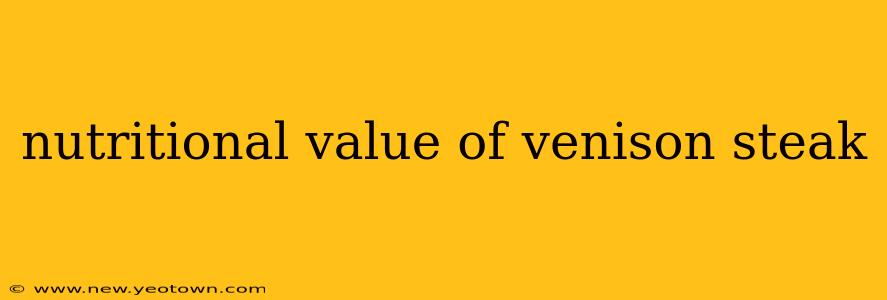Venison, the lean red meat from deer, has surged in popularity among health-conscious consumers. But what exactly makes it so desirable? Let's delve into the nutritional profile of venison steak and discover why it's a prized addition to many diets. Imagine this: a crisp autumn evening, the aroma of grilling venison filling the air… That's just the beginning of the venison experience, a culinary journey complemented by a wealth of nutritional benefits.
What are the nutritional benefits of venison?
Venison is a nutritional powerhouse, boasting a remarkable balance of protein, essential vitamins, and minerals, all while remaining exceptionally low in fat. Compared to beef, venison offers a significantly lower calorie count and fat content, making it a winner for those watching their waistlines. But it's not just about what it lacks; it's about what it provides. It’s a rich source of high-quality protein, crucial for building and repairing tissues, supporting a healthy immune system, and maintaining energy levels. The protein in venison is easily digestible, making it a great option for those with sensitive stomachs.
Is venison high in protein?
Absolutely! Venison is incredibly high in protein, typically containing around 25-30 grams per 3-ounce serving. This makes it an excellent choice for athletes, individuals engaging in strenuous physical activity, or anyone looking to boost their daily protein intake. This high protein content contributes to satiety, helping you feel fuller for longer and potentially aiding in weight management. Think of it as a natural appetite suppressant, helping you stay on track with your health goals.
How does venison compare to beef nutritionally?
The difference is striking. While both are excellent sources of protein, venison significantly outperforms beef in terms of fat content. A typical venison steak contains considerably less saturated fat and cholesterol than a comparable cut of beef. This makes venison a heart-healthy choice, reducing the risk of cardiovascular diseases associated with high fat intake. This isn't to say beef is bad; it's just that venison offers a leaner, healthier alternative for those seeking to optimize their nutritional profile.
What vitamins and minerals are in venison?
Beyond protein, venison is a rich source of essential vitamins and minerals. It's a good source of iron, crucial for oxygen transport throughout the body, preventing anemia and boosting energy. It also provides significant amounts of zinc, essential for immune function and wound healing. B vitamins, including B12, are also present in considerable quantities, vital for nerve function, energy production, and red blood cell formation. The nutrient profile is extensive and contributes to overall health and well-being.
Is venison good for weight loss?
Due to its high protein content and low fat, venison is an excellent choice for individuals aiming to lose weight or maintain a healthy weight. The high protein content promotes satiety, reducing cravings and preventing overeating. The low fat content minimizes unnecessary calorie intake, making it a smart addition to any weight-loss plan. The combination makes venison a valuable asset in achieving and sustaining a healthy weight.
Is venison healthier than chicken?
Both venison and chicken are considered healthy lean meats, but they offer different nutritional profiles. Chicken generally has lower fat content than venison, but venison surpasses chicken in iron and zinc content. The "healthier" choice depends on individual dietary needs and preferences. If you need a boost in iron and zinc, venison might be preferable. If you prioritize extremely low fat, chicken could be a better option. The choice is ultimately a matter of personal dietary goals.
In conclusion, venison steak offers a compelling combination of flavor and nutrition, making it a delicious and healthy addition to any diet. Its impressive protein content, low fat, and rich vitamin and mineral profile make it a true nutritional powerhouse. So, next time you're planning a meal, consider the delicious and healthy benefits of this lean, flavorful meat.

